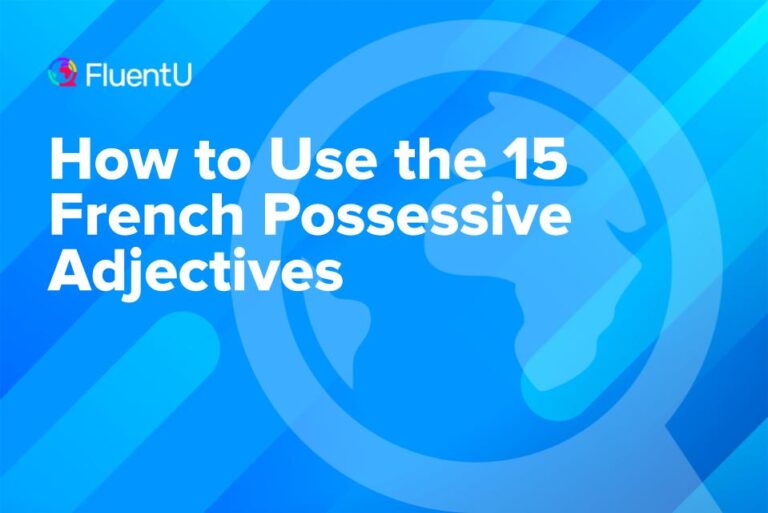“Very Good” in French: 24 Adjectives

There’s a lot that’s très bon (very good) about France and its language. French cuisine is unrivaled, French cafés and museums draw millions of visitors, and France has made its mark with writers like Victor Hugo and Albert Camus.
Très bien just doesn’t capture it all, though.
Learning several French adjectives for “very good” will allow you to more precisely describe France’s food, art, literature and anything else you find particularly fantastique (fantastic).
Download: This blog post is available as a convenient and portable PDF that you can take anywhere. Click here to get a copy. (Download)
Words to Describe Overall Value
When you think about it, “good” can mean many things, including morality (i.e., a good person), beauty (i.e., you look good) and quality (i.e., a good book).
Learning a variety of precise adjectives will help you communicate more effectively and stop saying the same two or three adjectives over and over again.
We’ll start by going over some general adjectives that describe the quality or value of an object, activity, idea or person.
In addition to the list below, you can also use the synonyms for “awesome” in this FluentU French YouTube video:
Très bon (Very good)
This is a very common adjective, and probably one of the first you ever learned in French. You should definitely keep it in your repertoire, but we’ll teach you many synonyms to diversify your vocabulary.
Note that to make bon feminine, you must double the last consonant, then add –e → bonne
Très (very) and vraiment (really) may be employed with many adjectives to strengthen its meaning, as in:
Il est vraiment génial ! (He’s really great!)
You’ve probably also encountered a similar phrase, très bien (very well).
Be careful, though, because bien is an adverb, not an adjective. For those of you who aren’t so grammar-savvy, just recall that an adjective modifies a person, place or thing, while an adverb modifies a verb, adjective or another adverb.
In other words, très bon characterizes the quality of something, while très bien describes how something is done.
Compare:
J’adore ce livre ! Il est très bon. (I love this book! It’s very good.)
J’adore ce livre ! Il est très bien écrit. (I love this book! It’s very well written.)
Très bien may also be used on its own as a synonym for d’accord (okay), as in:
Je vais rentrer un peu tard ce soir, je dois faire les courses. (I’ll return a little late tonight. I need to go shopping.)
Très bien (Very well).
Formidable (Great, Wonderful)
See this word in action with the song “Formidable” by Belgian musician Stromae. As with much of modern music, the topic is a relationship that seemed formidable, but just didn’t work out. English subtitles are included!
Merveilleux / Merveilleuse (Wonderful)
As you’ve noticed, some of these words have very similar meanings. Don’t worry too much about trying to find subtle differences. They’re generally interchangeable!
Génial / Géniale (Great, Amazing)
Il est génial ! (It’s great!)
Inouï (Unheard of, Unprecedented)
We’re focusing on positive adjectives, but keep in mind that this one could have a positive or negative connotation.
La bombe atomique était d’une violence inouïe. (The atomic bomb was of unprecedented violence.)
Sample conversation using adjectives of value and quality
Ça va ? (How are you?)
Ça va très bien ! (I’m doing very well.)
Comment ça ? (How so?)
J’ai reçu une note géniale à l’examen de la semaine dernière. (I received a great grade on last week’s exam.)
Formidable ! Quel cours ? (Wonderful! Which class?)
Anglais ! C’est inouï. D’habitude c’est le cours le plus difficile pour moi. (English! It’s unprecedented. It’s usually the most difficult class for me.)
Shared Words in French and English
If you’ve been playing the French learning game for any period of time, you’ve certainly run into words that mean the same thing in French and English with identical or almost identical spelling, like une pizza (a pizza). These are called cognates.
Be careful, though, as looks can be deceiving. There are also words in French that sound like a particular English word, but actually mean something quite different. These are called faux amis (false friends).
Here are some common French synonyms for “very good” that are almost exactly the same as their English counterparts. Use them as you’d use them in English.
Excellent / Excellente (Excellent)
Le film est excellent. (The movie is excellent).
Extraordinaire (Extraordinary)
La mise en scène est extraordinaire. (The production is extraordinary.)
Fantastique (Fantastic)
La musique est fantastique. (The music is fantastic.)
Magnifique (Magnificent)
L’histoire est magnifique. (The story is magnificent.)
Although translated as “magnificent,” a more accurate definition of the word magnifique is “wonderful.”
Words to Describe Character Traits
Thus far, we’ve examined words with broad usage. Magnifique may describe your sister, a video game, a bouquet of flowers or just about anything else you find especially great.
Now, let’s examine a more specific nuance of “good,” as in moral goodness.
These words pertain to positive aspects of personality, such as generosity or capacity for empathy. Therefore, you wouldn’t use them to talk about objects, only about people and possibly animals.
Keep in mind that we’re only covering positive adjectives here. Unfortunately, not everyone is kind and compassionate, so check out this article for more tips on how to describe people.
Gentil (Kind)
The last consonant doubles to form the feminine form gentille .
Ses parents sont gentils. (Her parents are nice.)
Attentionné (Caring)
Elle est si attentionnée qu’elle est bénévole dans une maison de retraite. (She is so caring that she’s a volunteer at a retirement home.)
Compatissant (Compassionate)
Elle est compatissante. Par exemple, elle est toujours prête à écouter si j’ai besoin de parler. (She is compassionate. For example, she is always ready to listen if I need to talk.)
Juste (Just, Righteous)
This is the strongest word in French for moral goodness.
Vertueux (Virtuous)
Tout le monde dit que c’est une jeune femme vertueuse. (Everyone says that she’s a virtuous young woman.)
A Green Mouse is a site that offers lessons and short stories for children learning French or Spanish. But whether you’re nine or 99, you might find this story video using character-trait adjectives helpful.
Words to Describe Beauty
“Good” may also refer to a pleasing physical appearance. We see this shade of meaning in the English phrase, “you look good.”
However, when you want to be more precise (or maybe score a date), you might want to try something new.
Beau (Lovely, Handsome, Beautiful)
When beau comes directly before a vowel or an –h (this letter is never pronounced in French), the spelling changes to bel , so that there aren’t two distinct vowel sounds right next to each other.
Un bel homme (A handsome man)
The feminine form of beau, belle , has a significantly different spelling, but it’s the same adjective.
Il a une belle famille. (He has a beautiful family.)
Joli (Pretty)
Sa femme est jolie. (His wife is pretty.)
Attrayant / Attrayante (Attractive)
Les filles à l’école trouvent l’autre fils attrayant. (The girls at school find the other son attractive.)
Mignon / Mignonne (Cute)
Son fils de cinq ans est si mignon. (His five-year-old son is so cute.)
Ravissant (Delightful, Charming)
L’aînée est ravissante et drôle. (The oldest daughter is charming and funny.)
Séduisant (Seductive, Enticing)
This word is related to the English word “seductive,” but it doesn’t always carry sexual overtones. It could refer to charm or attraction more generally. When used with objects, séduisant has the nuance of allure or temptation.
Une femme séduisante (a seductive woman)
Une offre séduisante (an enticing offer)
Informal Synonyms for “Very Good”
When you engage in conversation with native French speakers, especially younger ones, you’ll probably encounter informal words and phrases you don’t find in most textbooks.
There’s a world of difference between la langue de Molière (the language of Molière, a famous French author) and la langue verte (slang). Here are some casual words related to “very good.”
Chouette (Cool)
Une chouette is a type of owl, but the adjective chouette means “cool.” After all, owls are pretty cool!
Que penses-tu du musée ? (What do you think of the museum?)
C’est chouette ! (It’s cool!)
Épatant / Épatante (Splendid)
Les tableaux sont épatants. (The paintings are splendid.)
Sympa (Nice)
Like the English counterpart “nice,” sympa is a broad, vague term that can describe people or things.
This colloquialism is a shortened form of sympathique , so there are no number or gender changes if you’re using the informal form.
Le guide est sympa. (The guide is nice.)
Super (Super)
This adjective is invariable, meaning there are no gender or number spelling changes.
Mon tableau préféré est celui de Chagall. Les couleurs sont super ! (My favorite painting is that of Chagall. The colors are super!)
Chic (Nice, Classy)
The plural form for both genders is chics. There’s no singular feminine form.
Sans doute, c’était chic d’y aller. (Without a doubt, it was nice to go there.)
Rules to Remember When Using French Adjectives
Now that you know several new French adjectives, let’s review three grammatical rules to remember when using such words in context.
Adjectives are descriptive words, such as rouge (red), difficile (difficult) or délicieux (delicious). Not so intimidating, right?
There are, nevertheless, a few differences between English adjectives and French adjectives.
1. French adjectives must agree in gender with the noun they modify
Recall that all French nouns are either masculine or feminine, including objects and abstract concepts. Likewise, adjectives have masculine and feminine forms.
The spelling you find in a dictionary or vocabulary list is the masculine form, which means there won’t be any ending change if you employ that adjective with a masculine noun.
To form the feminine spelling, you simply modify the ending of the masculine adjective.
The most common changes include:
Adding an –e
If the masculine form already ends in –e, no change is made.
Formidable (great) is the masculine and feminine form.
Doubling the consonant, then adding –e
Changing –er to –ère
Étranger (foreign) → étrangère
Changing –eux to –euse
Changing –eau to –elle
Beau (beautiful, handsome) → belle
Changing –c to –che
That covers just about all the adjectives on our list today and the majority of those in French!
2. French adjectives must agree in number with the noun they modify
Just as a noun may be singular or plural, so too can an adjective. Singular adjectives accompany singular nouns, and plural adjectives accompany plural nouns.
To form most plural forms, simply add –s to the singular adjective form, whether masculine or feminine.
Excellent (Excellent) → Excellents
However, masculine nouns ending in –al change to –aux.
National (National) → Nationaux
Masculine nouns ending in –eau change to –eaux.
No changes occur for adjectives already ending in –s or –x.
Bas (Bow) and doux (soft) are the singular and plural forms.
To see more examples, check out these free online lessons about regular adjective formation and agreement with irregular adjectives.
3. Most French adjectives follow the noun
This is quite different from English, where the adjective always goes before the word it modifies.
For example, “a red car” becomes une voiture rouge (a car red) in French.
But in all languages, there are always exceptions. In fact, some of the simplest, most common French adjectives precede the noun. The good news is that there’s a helpful mnemonic that covers the majority of these adjectives: BAGS.
Beauty: beau/belle (beautiful), joli (pretty)
Age: vieux (old), jeune (young)
Goodness: bon (good), gentil (kind)
Size: petit (small), grand (big)
Since this article is all about words that mean “very good,” there are several that do precede the noun, especially if they’re short (one or two syllables). As you keep practicing French, you’ll get more accustomed to seeing adjectives in different places.
With the list of adjectives above, you’re now well on your way to using the many variations of “very good” in French accurately and effectively.
Hopefully, you can now use some of them to describe this article!
Download: This blog post is available as a convenient and portable PDF that you can take anywhere. Click here to get a copy. (Download)
And One More Thing...
If you like learning French at your own pace and from the comfort of your device, I have to tell you about FluentU.
FluentU makes it easier (and way more fun) to learn French by making real content like movies and series accessible to learners. You can check out FluentU's curated video library, or bring our learning tools directly to Netflix or YouTube with the FluentU Chrome extension.
One of the features I find most helpful is the interactive captions—you can tap on any word to see its meaning, an image, pronunciation, and other examples from different contexts. It’s a great way to pick up French vocab without having to pause and look things up separately.
FluentU also helps reinforce what you’ve learned with personalized quizzes. You can swipe through extra examples and complete engaging exercises that adapt to your progress. You'll get extra practice with the words you find more challenging and even be reminded you when it’s time to review!
You can use FluentU on your computer, tablet, or phone with our app for Apple or Android devices. Click here to take advantage of our current sale! (Expires at the end of this month.)










